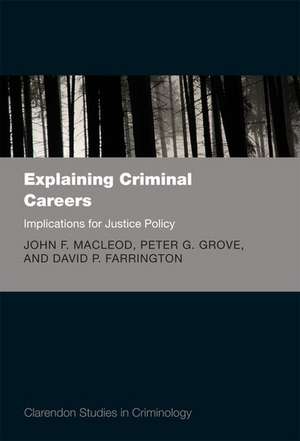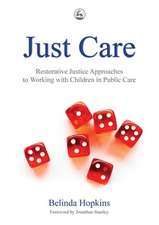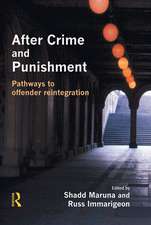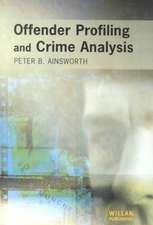Explaining Criminal Careers: Implications for Justice Policy: Clarendon Studies in Criminology
Autor John F. MacLeod, Peter G. Grove, David P. Farringtonen Limba Engleză Hardback – 22 aug 2012
Din seria Clarendon Studies in Criminology
- 30%
 Preț: 524.88 lei
Preț: 524.88 lei - 27%
 Preț: 539.99 lei
Preț: 539.99 lei - 30%
 Preț: 597.87 lei
Preț: 597.87 lei - 30%
 Preț: 539.03 lei
Preț: 539.03 lei - 30%
 Preț: 540.50 lei
Preț: 540.50 lei - 30%
 Preț: 518.78 lei
Preț: 518.78 lei - 30%
 Preț: 598.04 lei
Preț: 598.04 lei - 30%
 Preț: 521.83 lei
Preț: 521.83 lei - 30%
 Preț: 538.41 lei
Preț: 538.41 lei - 30%
 Preț: 537.95 lei
Preț: 537.95 lei - 30%
 Preț: 539.99 lei
Preț: 539.99 lei - 28%
 Preț: 499.76 lei
Preț: 499.76 lei - 30%
 Preț: 539.57 lei
Preț: 539.57 lei - 27%
 Preț: 500.43 lei
Preț: 500.43 lei - 19%
 Preț: 673.85 lei
Preț: 673.85 lei - 30%
 Preț: 659.34 lei
Preț: 659.34 lei - 30%
 Preț: 838.79 lei
Preț: 838.79 lei - 27%
 Preț: 658.11 lei
Preț: 658.11 lei - 28%
 Preț: 496.73 lei
Preț: 496.73 lei - 25%
 Preț: 561.63 lei
Preț: 561.63 lei - 28%
 Preț: 424.05 lei
Preț: 424.05 lei - 31%
 Preț: 395.73 lei
Preț: 395.73 lei - 34%
 Preț: 579.34 lei
Preț: 579.34 lei - 14%
 Preț: 196.70 lei
Preț: 196.70 lei - 34%
 Preț: 600.54 lei
Preț: 600.54 lei - 30%
 Preț: 522.10 lei
Preț: 522.10 lei - 18%
 Preț: 339.31 lei
Preț: 339.31 lei - 19%
 Preț: 253.88 lei
Preț: 253.88 lei - 15%
 Preț: 395.89 lei
Preț: 395.89 lei - 34%
 Preț: 574.69 lei
Preț: 574.69 lei - 18%
 Preț: 301.83 lei
Preț: 301.83 lei - 34%
 Preț: 559.90 lei
Preț: 559.90 lei - 32%
 Preț: 466.28 lei
Preț: 466.28 lei - 34%
 Preț: 497.62 lei
Preț: 497.62 lei - 34%
 Preț: 522.00 lei
Preț: 522.00 lei - 30%
 Preț: 503.29 lei
Preț: 503.29 lei - 31%
 Preț: 413.86 lei
Preț: 413.86 lei - 34%
 Preț: 629.61 lei
Preț: 629.61 lei - 19%
 Preț: 566.42 lei
Preț: 566.42 lei - 9%
 Preț: 252.66 lei
Preț: 252.66 lei - 13%
 Preț: 167.56 lei
Preț: 167.56 lei - 31%
 Preț: 486.45 lei
Preț: 486.45 lei - 34%
 Preț: 633.17 lei
Preț: 633.17 lei - 30%
 Preț: 538.24 lei
Preț: 538.24 lei - 10%
 Preț: 270.63 lei
Preț: 270.63 lei - 31%
 Preț: 401.95 lei
Preț: 401.95 lei - 28%
 Preț: 473.39 lei
Preț: 473.39 lei
Preț: 486.27 lei
Preț vechi: 696.83 lei
-30% Nou
Puncte Express: 729
Preț estimativ în valută:
93.05€ • 97.40$ • 77.45£
93.05€ • 97.40$ • 77.45£
Carte tipărită la comandă
Livrare economică 19-25 martie
Preluare comenzi: 021 569.72.76
Specificații
ISBN-13: 9780199697243
ISBN-10: 0199697248
Pagini: 274
Dimensiuni: 154 x 219 x 21 mm
Greutate: 0.46 kg
Editura: OUP OXFORD
Colecția OUP Oxford
Seria Clarendon Studies in Criminology
Locul publicării:Oxford, United Kingdom
ISBN-10: 0199697248
Pagini: 274
Dimensiuni: 154 x 219 x 21 mm
Greutate: 0.46 kg
Editura: OUP OXFORD
Colecția OUP Oxford
Seria Clarendon Studies in Criminology
Locul publicării:Oxford, United Kingdom
Recenzii
The authors of ^iExplaining Criminal Careers^r bring to play sound expertise in psychology, statistics and mathematical modelling and after examining the validity of existing criminal career theories, they propose a new theory to explain offending, conviction and reconviction.
Notă biografică
John F. MacLeod, currently a Visiting Scholar at the Institute of Criminology, Cambridge University, retired in 2007 from a long career as a government scientist. Whilst working for the Home Office he conducted research, analysis and modelling in support of criminal justice policy, with a particular interest in criminal careers.Peter G. Grove previously worked for Home Office on a number of areas of quantitative criminology. This included acting as statistical advisor for the national evaluation of the effectiveness of CCTV and the British Crime Survey. In collaboration with John Macleod, he constructed a quantitative predictive theory of offending behaviour.David P. Farrington, OBE, is Professor of Psychological Criminology at the Institute of Criminology, Cambridge University. His major research interest is in developmental criminology, and he is Director of the Cambridge Study in Delinquent Development, which is a prospective longitudinal survey of over 400 London males from age 8 to age 48.









